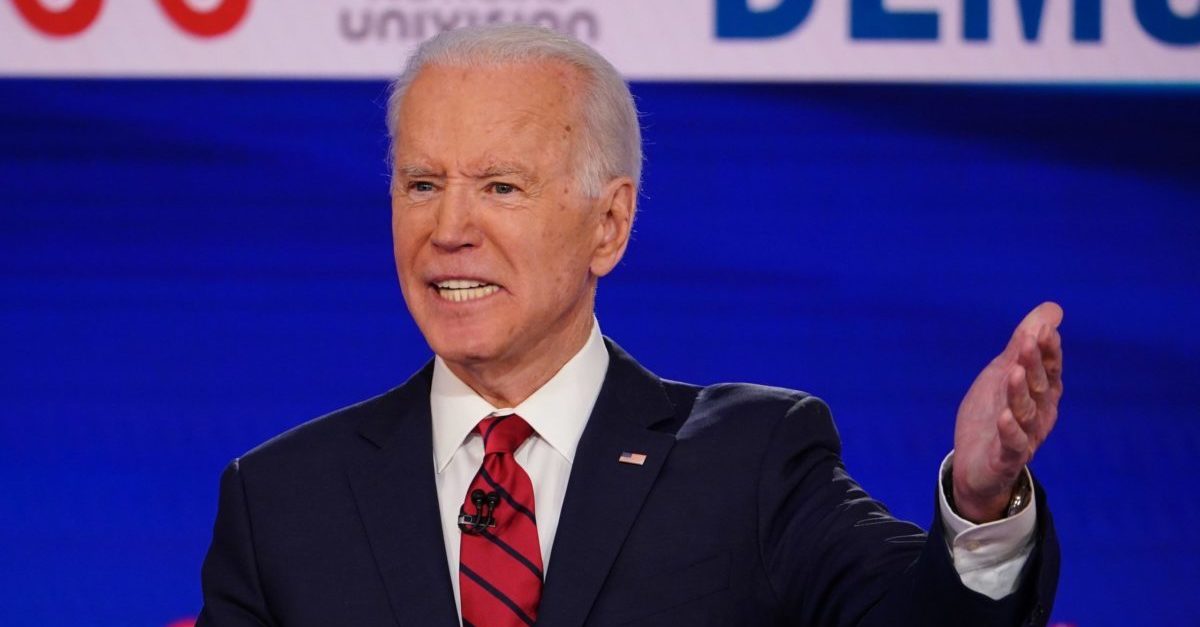
Biden speaks during the 11th Democratic Party presidential debate in a CNN studio on March 15, 2020.
Presumptive Democratic presidential nominee Joe Biden is reportedly worried that President Donald Trump will seek to delay the November election. Per a late Thursday CNN report, Biden said this at a “virtual” fundraiser (referencing Trump): “Mark my words: I think he is gonna try to kick back the election somehow, come up with some rationale why it can’t be held.”
Despite Biden’s fears, “Trump cannot unilaterally change the date of the election in November, as it has been set into law by federal statute and Congress would have to OK such a move,” CNN immediately pointed out. Moving the election date would require Congress to change the law CNN cited and perhaps several others ones. (The actual presidential electors appointed to the electoral college are selected pursuant to a different law, but the date is still the same.)
Though federal law gives the president some power to declare national emergencies, such power is expressly limited to only those statutes where Congress authorizes the president to exercise such power. The statutes which set the date for the election do not facially contain a clause which allows the president to declare an emergency which could result in a delay. Congress also has the power to terminate a presidential emergency. Presidential emergency declarations, like disaster declarations, are limited. Presidential disaster declarations must be requested by state governors.
Law&Crime was among the very first to ponder the potential effects of the coronavirus on the presidential election. Besides having no power to alter the date of the election, Trump cannot use the virus as an excuse to stay in office. The 20th Amendment of the U.S. Constitution states with zero ambiguity that the terms of office for the president and the vice-president end “at noon on the 20th day of January … and the terms of their successors shall then begin.”
Since Law&Crime’s analysis, Harvard Law professor emeritus Alan Dershowitz has pondered the complete failure of the election. Such a scenario seems unlikely given the patchwork nature of the spread of the virus and the legal roles of the states in setting various election dates and parameters; however, the law is, as Dershowitz notes, disturbingly unclear about emergencies of this nature during an election year.
“Because of the uncertainty of any alternative to voting, it is in the interest of both parties and all Americans to make sure that the election is held in a safe and timely manner,” Dershowitz concluded.
During the virtual fundraiser, Biden looked back at the recent Wisconsin primary election to take additional aim at Republicans for “trying to force in-person voting no matter the health cost.”
“We have to figure out how we are going to conduct a full and fair and safe election in November, and no one should have to risk their lives to cast a ballot,” Biden said, according to the CNN report.
Biden also opined that local officials were correct to seek federal support for conducting elections by mail. “I think it’s absolutely mindless, mindless, that they are unwilling to do it. I don’t get it. I don’t get it,” he said with reference to federal officials, including Trump and Senate Majority Leader Mitch McConnell (R-Ky.), refusing to allow mail-in ballots due to what Biden called “false claims of voter fraud.”
Biden also accused the Trump Administration of trying to use coronavirus-related federal loan legislation to force changes within the United States Postal Service in an attempt to “make it very hard for people to vote” by mail.
“That’s the only way he thinks he can possibly win,” Biden said. He then raised the possibility of Russian collusion: “You can be assured between (Trump) and the Russians there is going to be an attempt to interfere” in the election.
[Image via MANDEL NGAN/AFP via Getty Images]
Have a tip we should know? [email protected]